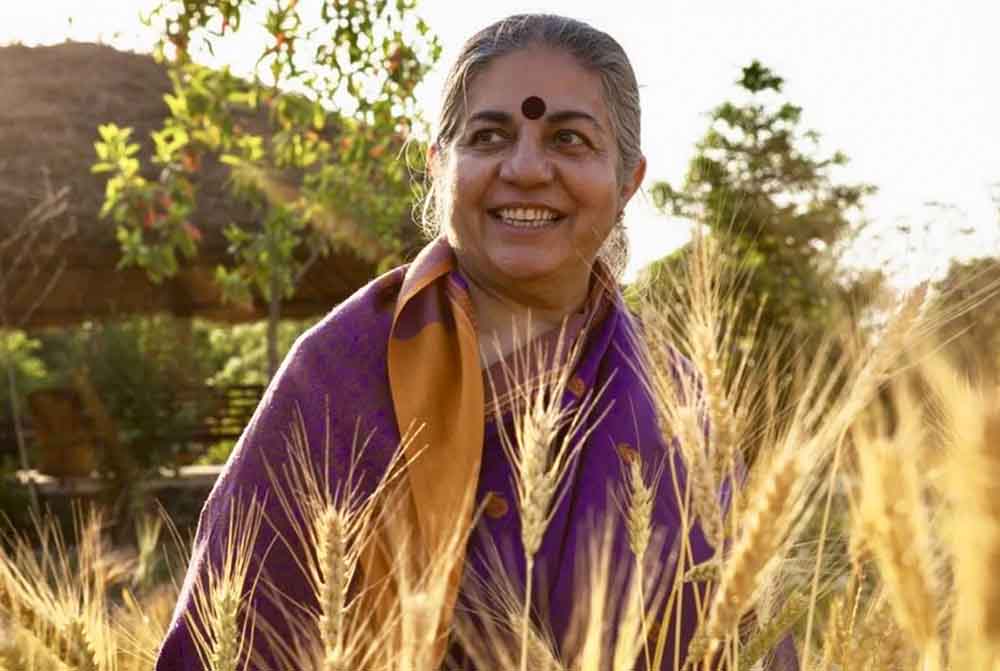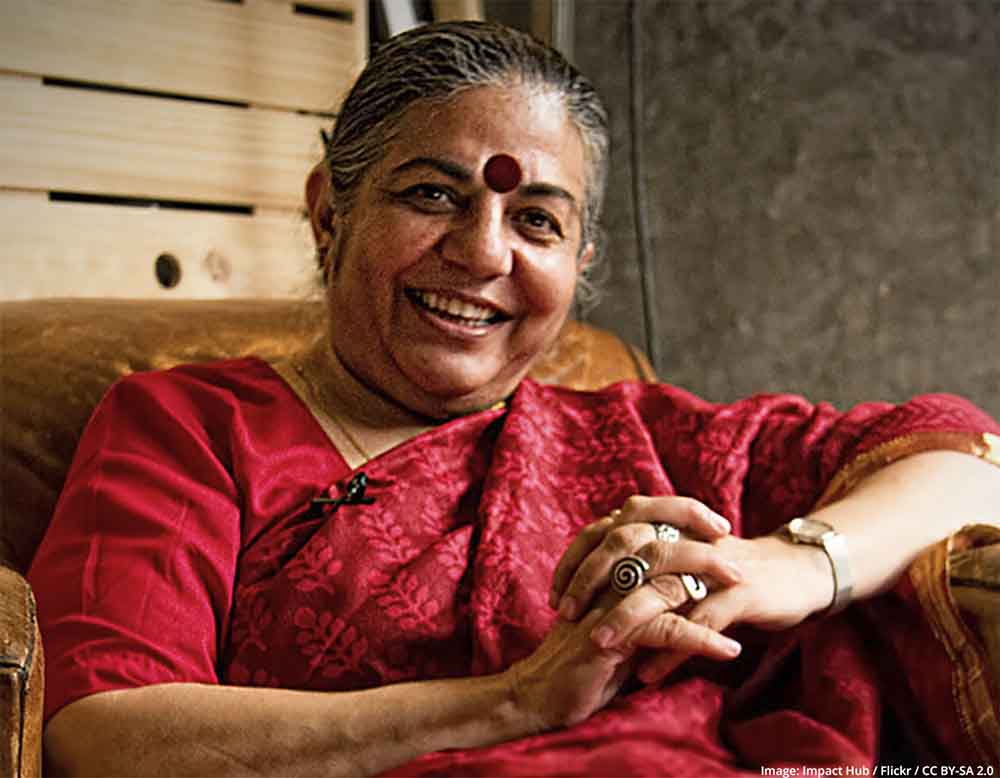Dr Vandana Shiva is a globally renowned environmentalist, eco-feminist, and author known for her unwavering commitment to biodiversity, sustainable agriculture, and ecological justice. With a background in physics and a dedication to promoting organic farming, Dr Shiva has become a powerful voice against industrial agriculture, genetic modification, and the monopolisation of seeds by global corporations. Her advocacy extends beyond traditional activism; she is an academic, author, and founder of Navdanya, an organisation aimed at preserving biodiversity and empowering farmers. Dr Shiva’s life work reflects a passionate stance for eco-friendly farming and community-driven agricultural practices, making her a transformative figure in environmental activism.
Dr Shiva’s efforts go beyond agricultural reform, as she connects environmental preservation to broader social issues, such as women’s rights, community resilience, and economic justice. Her activism and extensive body of writings highlight the environmental and social injustices embedded in conventional industrial practices, pushing for an agricultural system that nurtures both people and the planet. Over the years, Dr Vandana Shiva has become a transformative figure in the global environmental movement, advocating a holistic, eco-friendly, and community-centred approach that has inspired countless individuals and organisations worldwide.
Childhood and Family Background
Dr Vandana Shiva was born on November 5, 1952, in Dehradun, nestled in the Himalayan foothills of India. Her family environment greatly shaped her worldview; her father was a conservator of forests, and her mother was a farmer with deep respect for the land and traditional agricultural practices. Growing up in a household where nature was both livelihood and legacy, Shiva developed an innate connection with the environment. She explored the hills and forests, absorbing her mother’s wisdom about the soil, crops, and natural ecosystems, fostering her lifelong commitment to nature and sustainable agriculture.
Dr Shiva was also academically inclined from a young age, showcasing a remarkable talent for science and logic. She attended St Mary’s Convent High School in Nainital and went on to pursue a Bachelor’s degree in Physics from Panjab University in Chandigarh. Her passion for understanding the universe and natural systems led her to pursue a PhD in the Philosophy of Science from the University of Western Ontario, Canada. Her dissertation on quantum theory laid the foundation for her deep understanding of complex systems, a perspective that she would later apply to agricultural ecosystems. Dr Shiva’s early exposure to nature and science cultivated her holistic understanding of the interconnectedness between environmental health, human wellbeing, and sustainable agriculture.

Major Contributions in Biodiversity and Agriculture
As an environmental activist, Dr Vandana Shiva has championed numerous causes that aim to protect biodiversity and create sustainable agricultural practices. In 1987, she founded Navdanya, a national movement to conserve the diversity of seeds, promote organic farming, and establish seed banks across India. The organisation’s work helped thousands of Indian farmers adopt sustainable agricultural methods while preserving indigenous seed varieties. Navdanya’s efforts have not only protected genetic diversity but also challenged the corporate control over seeds, notably opposing genetically modified organisms (GMOs) that threaten traditional farming practices and ecological balance.
One of Dr Shiva’s most recognised contributions is her outspoken opposition to corporate monopolies, particularly in the agriculture sector. Her criticism of companies that patent seeds and genetically modify crops highlights her stance against practices that exploit farmers and degrade biodiversity. Her work has also spotlighted the impact of monoculture farming on ecosystems, advocating instead for diverse, resilient farming systems that promote soil health and resist pest outbreaks. Dr Shiva’s efforts in promoting agroecology have inspired a global shift towards organic and regenerative farming, positively impacting both the environment and local communities.
Challenges Faced by Vandana Shiva
Despite her influential work, Dr Vandana Shiva has faced considerable challenges, particularly from corporations and governments that advocate for industrial agriculture and genetic modification. Her critique of large corporations, such as Monsanto, attracted both legal and social resistance. These companies, driven by profit and the desire to control the agricultural market, opposed her efforts to promote traditional seed saving and organic farming, often labelling her views as anti-progressive or anti-technology. She faced lawsuits, media smear campaigns, and pressure from corporate lobbies, all of which attempted to undermine her credibility.
In addition to corporate challenges, Dr Shiva’s advocacy in rural and developing communities placed her at odds with government policies that favoured industrialisation and modernisation of agriculture. Governments often promoted cash crops, heavy pesticide use, and chemical fertilisers to increase productivity, policies that Dr Shiva opposed due to their ecological impact. Despite these hurdles, her persistence and ethical approach helped her gain respect and support from environmental groups, farmers, and activists worldwide. Her resilience in the face of adversity underscored her commitment to ecological and social justice.
Impact and Influence of Vandana Shiva
Dr Vandana Shiva’s impact extends across continents, influencing policymakers, environmentalists, farmers, and activists. Her emphasis on ecofeminism—linking the exploitation of women and nature—has resonated deeply, making her a pivotal figure in the global ecofeminist movement. She has influenced policy discussions on sustainable agriculture and biodiversity preservation at institutions such as the United Nations and the World Economic Forum, advocating for a shift away from industrialised agriculture toward eco-friendly practices that benefit small-scale farmers and indigenous communities.
Her activism has also empowered farmers around the world, particularly women in rural India, to reclaim their roles as seed custodians and ecological stewards. Dr Shiva’s work with Navdanya has established a model for community-led agricultural practices that emphasise self-sufficiency and respect for local biodiversity. By highlighting the role of traditional knowledge and local expertise in agricultural systems, she has influenced the global dialogue on food security, paving the way for sustainable farming policies. Vandana Shiva’s transformative impact continues to inspire new generations to pursue ecological justice and sustainability.
Books and Writings by Vandana Shiva
Dr Vandana Shiva has authored several influential books that delve into topics of globalization, environmental degradation, and sustainable development. Her writings articulate the threats posed by corporate-led agriculture and the solutions offered by community-based ecological practices. Some of her notable works include:
● “Staying Alive: Women, Ecology, and Development” – This book connects the exploitation of women and nature, introducing ecofeminism as a framework for understanding the environmental crises and advocating for the empowerment of women in ecological preservation.
● “The Violence of the Green Revolution” – A critique of the Green Revolution’s impact on Indian agriculture, this book discusses the detrimental effects of monoculture and chemical-intensive farming, urging a shift towards biodiversity and sustainable practices.

● “Biopiracy: The Plunder of Nature and Knowledge” – In this work, Dr Shiva examines the privatisation and patenting of biological resources by corporations, raising awareness of the unethical exploitation of indigenous knowledge and biodiversity.
● “Earth Democracy: Justice, Sustainability, and Peace” – This book outlines the principles of eco-democracy, advocating for grassroots efforts to counter corporate dominance and promote ecological justice.
Dr Shiva’s publications have reached global audiences, with her books translated into multiple languages. Through her writings, she educates readers on the urgent need to preserve biodiversity, support indigenous wisdom, and resist corporate exploitation of natural resources.
Conclusion
Dr Vandana Shiva’s life and work symbolise a powerful commitment to environmental justice, biodiversity, and sustainable farming. Her dedication to protecting seeds, promoting organic agriculture, and resisting corporate control has made her an icon in the environmental movement. As a scientist, activist, and writer, she has championed a path that respects nature, honours traditional wisdom, and advocates for ethical environmental stewardship. Dr Shiva’s enduring legacy inspires people worldwide to envision and work towards a world where agriculture supports both humanity and the planet’s ecosystems.
FAQs
Who is Vandana Shiva?
Vandana Shiva is an Indian environmental activist, author, and founder of Navdanya. She is known for her advocacy of biodiversity, sustainable agriculture, and ecofeminism.
What is Dr Vandana Shiva’s educational background?
Dr Shiva holds a PhD in the Philosophy of Science from the University of Western Ontario, specialising in quantum theory. She also studied physics in India, which laid the foundation for her scientific understanding of complex ecosystems.
What are some major contributions of Vandana Shiva?
Dr Shiva founded Navdanya, a movement to protect seed biodiversity and promote organic farming. She has opposed GMOs and corporate control over seeds, advocating for policies that support local, sustainable agriculture.
What is ecofeminism, and how does it relate to Vandana Shiva?
Ecofeminism links the exploitation of nature with the oppression of women. Dr Shiva’s work connects environmental degradation to gender inequality, encouraging ecological practices that empower women and protect biodiversity.
Has Vandana Shiva written any books?
Yes, she has written numerous books, including “Staying Alive”, “The Violence of the Green Revolution”, and “Earth Democracy”, addressing environmental justice, corporate exploitation, and the importance of biodiversity.